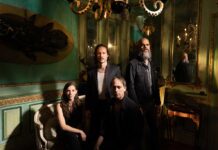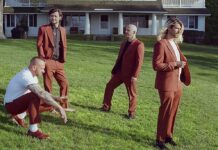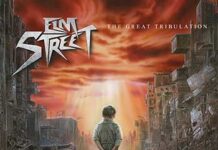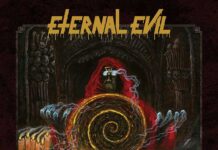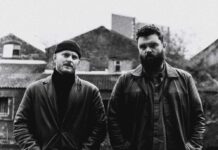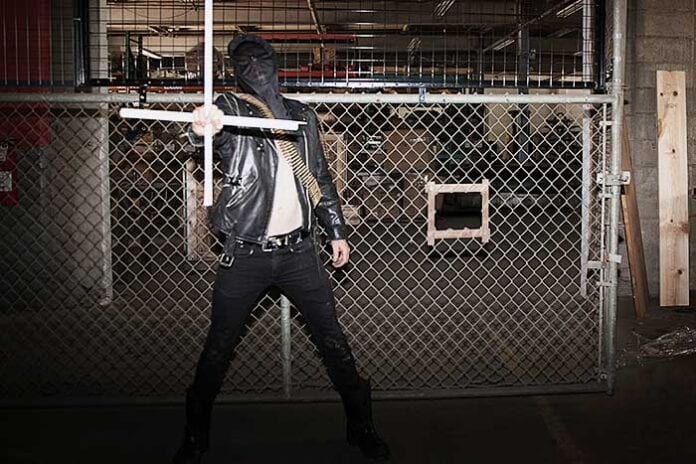
INTERVIEW WITH ATHENAR BY JOE DALY
PHOTOGRAPHS BY HANNAH VERBEUREN
It almost beggars belief that, 17 years into Midnight’s career, they remain something of a best kept secret—a seditious pleasure celebrated only by those who lurk in the darkest alleys of the underground. Founded in Cleveland in 2003, Midnight is a one-man shop, conceived by multi-instrumentalist Athenar, whose original vision saw the band staying well out of the spotlight, favoring EPs and split releases over full albums. The approach was both celebrated and bemoaned by his growing fan base. On one hand, it was impossible not to applaud someone throwing their gnarled middle finger at record industry conventions. On the other, Midnight’s releases were, across the board, supremely addictive, inhabiting a world where black metal, punk, death, and classic rock all fuse together in jagged salvos of grimy riffs, sharp hooks, and speedy tempos. 2011’s Satanic Royalty saw the band garner global attention and established that Athenar’s modest, DIY ambitions had expanded somewhat over the years.
Part of Midnight’s mystique took root in Athenar’s long-standing reluctance to tour. Along with a pair of touring musicians, he would take Midnight out for one-off shows and limited runs, but he declined substantially more offers to play than he accepted. Also, the mercurial frontman wears a black hood on stage and in promo photos, keeping his worldly identity a closely guarded secret. Such trappings did little to elevate Midnight’s profile.
2017’s Sweet Death and Ecstasy served up Midnight’s most diverse, catchy, and lyrically provocative material to date, and building on the momentum, the band recently inked a deal with the legendary Metal Blade Records, who just released Midnight’s latest (and finest) outing yet, Rebirth by Blasphemy. 2019 also saw the band hitting the road for over 70 shows—a record for Midnight—including a highly celebrated run with Abbath and Obituary. All indicators point to greater successes ahead and perhaps more opportunities for fans to see the band live.
When we catch up with Athenar, he’s at his home in Cleveland, getting ready for the day and listening to…Tom Petty?
Are you a big Tom Petty guy?
Oh yeah. I like all his stuff, in general, but especially the late 70s and early 80s stuff, with Stan Lynch on drums. That guy’s got great feel.
Is it fair to say that you’d count classic rock as a major influence?
Definitely. Cleveland is a classic rock town. The upbringing here has never been strictly punk or metal. You were allowed to listen to Tom Petty and The Pagans and Destructor and bands like that. There were really no rules. Led Zeppelin was a great entry level band for me. They’re still underrated, in my opinion. People seem to love or hate Led Zeppelin, but I’ll take them any day.
Wait, you think Led Zeppelin is underrated?
Yeah. I still think they’re an underrated band. Classic rock stations play the same Led Zeppelin and Pink Floyd songs over and over again, but when you listen to them within the context of the albums they released, and then listen album by album, then you start to realize what they actually did.
Well, they released their first five albums in four years. That’s unheard of today.
Absolutely. And they did that with all the gigs, too. They weren’t sitting around, they were working. When they weren’t gigging, they were in the studio. That’s why Physical Graffiti is made up of songs recorded for other albums.
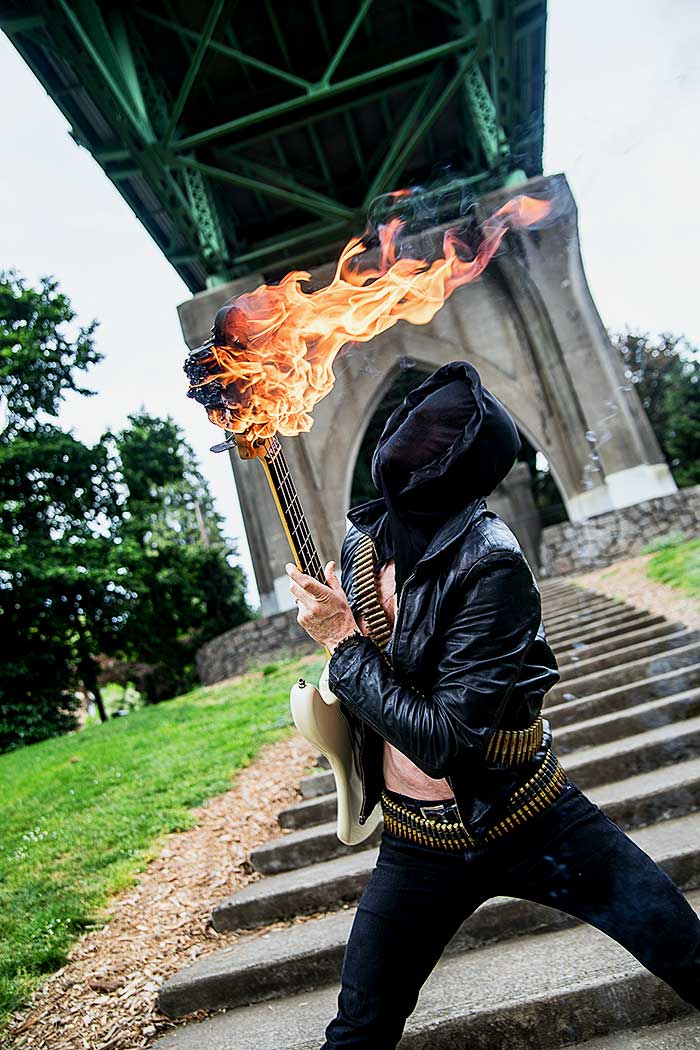
Moving back into the present, how would you assess 2019 on a personal level?
It was a very interesting year, all around. Musically, personally, everything was always on the go. I think it was all necessary, for sure.
In the years prior, Midnight stayed largely off the road and under the radar. Then last year you hopped on some pretty big tours, you signed a deal with Metal Blade Records, and you recorded the new album. It felt like a breakout year.
Yeah, I think so. We did a lot more gigs and we exposed ourselves, if you will—not to children (laughs)—but to people in general, who were willing to accept our exposed-ness. We went back to Europe for the first time since 2015. We were just out doing gigs. Whereas before, I used to have a lot of rules for myself, as to whether to accept gigs or not. This time around I thought, “Let’s just do some gigs.”
You ended the year touring North America with Abbath and Obituary—an eclectic bill where each of the bands came from very different backgrounds and genres. How was it for Midnight?
It was great. It’s funny because we were on right before Abbath, so it was kind of like one dude punching in and one dude punching out on the time clock. As we were coming off stage and heading to our dressing room, Abbath would be warming up in the dressing room, getting ready to go on. At one of the early stops, the people were giving the chant for us after our set, and Abbath’s drummer says, “Wow, you guys are pretty popular. Do you have albums out?” (laughs) I said, “Yeah, I’ve got a couple.” He said, “Oh? Is it on Spotify?” I said, “I don’t know, maybe?” And he said, “Well, I’ll have to check it out!” (laughs) That was pretty humorous to me.
On stage you wear a hood that entirely masks your identity. Does that make it hard to interact with fans?
I’ve never given that too much thought about it, and I’m not very worried about that, either. It’s not a matter of fans and musicians—we’re all just people. So, if I run into somebody and strike up a conversation, then it happens. I’m not really worried about hiding away or anything. I’m just going to be myself.
“I’M STILL GOING TO MAKE THE SONGS I’M GOING TO MAKE, REGARDLESS OF THE LABEL. AND THAT’S THE WHOLE POINT OF DOING IT.”
Before last year, Midnight seemed to actively avoid any sort of commercial success—the lack of touring, for example. What happened?
What changed was like that Celtic Frost song, “Visions of Mortality.” I realized that this ride isn’t going to last forever, so why not get out of the basement, literally, and leave the house? Why not? You look at certain bands and think, “I don’t want to be like that,” and so I kept the whole thing really guarded. Maybe I was afraid to be like other bands that I really don’t care for. But then I realized that even with the Metal Blade deal, I’m still going to make the songs I’m going to make, regardless of the label. And that’s the whole point of doing it.
How did your approach to the new album differ from Sweet Death and Ecstasy?
Not at all. There was no difference. It’s always been the same, just grabbing a song idea and making a tune out of it. Recording it the same way, too. It’s pretty simple—just get the drums going and start from the bottom like that, then add the guitars and bass. It’s always been the same. There’s really never too much of a difference.
Do you decide to release an album and then put together the songs for it, or do you write songs until an album emerges?
The latter. That’s basically it. Since Satanic Royalty, it’s been about grabbing 30 minutes worth of songs and that’s been the way. There’s never been any set plan where I’m like, “Okay, I’m going to sit down and write this week.” When a song comes, it comes. So, there’s not a lot of on purpose writing going on.
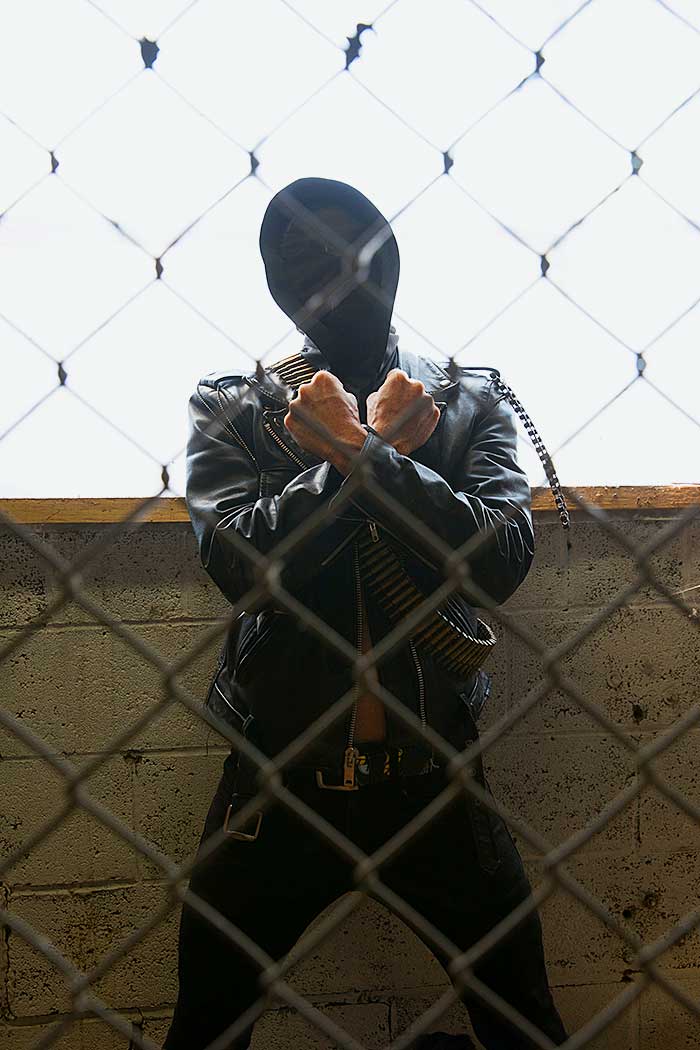
Your songwriting approach might not have changed, but presumably you, as a musician, have.
I think I’ve gotten maybe 10 percent less sloppy? (laughs) It’s a sad thing to say, but it’s still the same. There’s been maybe a bit of progression on the drums. If you listen to the really early stuff, and then listen to Sweet Death and Ecstasy or this new album, you can tell that the drumming is a little better. But yeah, that’s about it, musically. I think that as you improve as a musician, you learn what not to play. You tend to come up with better songs when you approach them a bit more critically, like, “That’s unnecessary, and that’s unnecessary, and trim that…” You learn to just play what’s important to the song.
“IT HAD BEEN A VERY NEGATIVE FEELING FOR THE PAST FEW YEARS. THEN I DECIDED TO KICK MYSELF IN THE ASS AND MAKE UP THIS POSITIVE SONG AND JUST FEEL GOOD.”
You’ve said that “Escape the Grave” is a positive song that was going to set the vibe for the whole record.
Yeah, absolutely. We hadn’t been touring a lot and we weren’t accepting a lot of things. We didn’t want to go to Europe, we didn’t want to do this or that, so it had been a very negative feeling for the past few years. Then I decided to kick myself in the ass and make up this positive song and just feel good. I was feeling like Dee Snider of Twisted Sister’s message of positivity! That too, came out. But it was, “Get off your ass and do something.” That type of a song.
But then the mood changes.
Old habits die hard, man (laughs). That negative outlook creeps back in and it’s easy to do. Maybe it’s the seasons here in Cleveland and the cold and dreariness? It just creeps back in and that negative outlook peeks its head out and you start getting songs like “Rebirth by Blasphemy,” and songs that question why you’d ever want to leave the womb.
Lyrically, what inspires you?
Not necessarily stuff like movies or headlines. It’s more day-to-day things that happen in life. Looking at the little things that happen and personal experiences. People can either relate to those or they can hear something totally different. They can see the song however the hell they want, which is good, too. That’s what songs are there for.
“Warning from the Reaper” surveys some pretty bleak themes. What inspired it?
I guess it was a generic topic, but it’s about drug use around here. Heroin and stuff have been hugely popular around here in the past few years, and in Michigan, too. Not that I’d really know, but I had a couple of co-workers who died from it. It was kind of strange. I wasn’t tremendously close to them, but we were co-workers and they were good people and we got along. I would never have guessed that they were raging heroin addicts. These people would show up for work all the time, but then one day they don’t and someone tells you, “So and so isn’t coming into work today. They died yesterday.” That happened to two people. I thought it was strange that they had a job, they had cars, and to me, they were productive members of society. It was strange to me that they’d choose to kill themselves.
Venom and Bathory are among the more obvious influences across Midnight’s catalog, and in the title track of the new record, you hear the unmistakable gallop of an Iron Maiden song. Do you follow new metal as well?
Not too much. I’m an old buzzard. I don’t care for most of the modern production. It’s so overproduced, with those clicky bass drums. There’s stuff that I do like from newer bands, but it’s the stuff with less production. I don’t really care for the more popular stuff.
Your stage show is over-the-top. You guys cover your faces with hoods, you wear bulletbelts, and, if your show in San Diego is indicative of others, you literally climb the ceiling. How much of that is authentic and how much, if any, is you lampooning metal clichés?
There’s a bit of that stuff because that’s what I grew up with and that’s the stuff that’s in me, so it’s going to come out somewhere. And when I play this music, that’s the stuff that comes out, and people can take that as they want. If they smile and have fun, then that’s great, and if they get pissed and want to smash a bottle, that’s great, too! It’s all how you interpret this art (laughs).
Outside the band, what else do you do?
Music is all I’ve got, man. That’s the reason to do these live gigs. The negativity over the past few years was getting bad, and I finally realized that not doing these gigs and taking on all of this was shitty. Running around on stage, throwing stuff, screaming and doing whatever the hell—that’s what it is. That’s what keeps me from going crazy.
“I’M NOT LOOKING TO BE ACCEPTED. THE NORMAL WORLD WILL HOPEFULLY COME AROUND TO MY WARPED WAY OF THINKING.”
Are you more open to commercial success now than you were five years ago?
Well, I’m going to do what I’m going to do, no matter what. Whether I’m on Metal Blade, Hells Headbangers…if people like the music at a gig, that’s great. So, I guess that would mean that I’m more open to that kind of success because I’m not guarding it as much as I once did. I’m doing interviews and stuff like this. Before I wouldn’t accept interviews or a lot of other stuff. So, maybe there’s a bit of me trying to infiltrate the normal world, but I’m not going to fall into the normal way of doing things and I’m not looking to be accepted. The normal world will hopefully come around to my warped way of thinking.
What’s in store for 2020?
I’m going in next week to start recording the new album, so there’s a new album getting done and then more gigs. We’re hitting some European festivals over the summer and some more gigs, so we’ll see what happens after that.
Where would you like to see Midnight 10 years from now?
I’d like to see me sucking some air! (laughs) As long as I’m doing that, I’m good.








